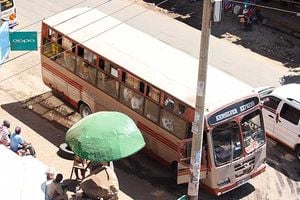
A welder repairs one of the damaged tanks at Chemelil Sugar Company. Most of the Government owned sugar mills have very old engines which breakdown frequently hence leading to poor production at high costs.
| File | Nation Media GroupBusiness
Premium
State millers stare at staffing crisis as leasing programme remains opaque
What you need to know:
- At Awendo-based Sony Sugar, a recent exit of middle level managers is said to have left operations in limbo and the hiring freeze means they may not be replaced any time soon.
The neighbouring miller, Chemelil Sugar Company is similarly in a precarious staffing situation.
State-owned sugarcane millers are staring at a staffing crisis after the government froze new hiring in preparation for their leasing, which hangs in the balance over a court case.
The move has pushed the factories into more woes as expertise needed to run the mills exit with retirement, staff resigning due to poor pay and uncertainty surrounding leasing of the plants.
Managers who spoke to Smart Business on and off record detailed a difficult operations scenario with most employees now on a casual basis including managers running critical sections of the mills such as finance.
“We have asked the ministry to allow us to hire more staff even just temporarily to keep us running effectively. Once it is approved, we will be able to employ more staff and fill the many gaps we have in the workforce,” Muhoroni Sugar Company Receiver Manager Francis Ooko said.
The miller is the hardest hit by the staffing crisis after some of its senior managers were forcefully ejected by farmers and other employees on allegations of running down the miller and propagating corruption.
Mr Ooko and his partner, Mr Harun Kirui, were faulted for failing to decide the fate of the seven managers who continue to occupy company houses and are being paid parallel to another set of managers appointed to hold their offices in acting capacities.
Covid-19 prevention guidelines
The neighbouring miller, Chemelil Sugar Company is similarly in a precarious staffing situation.
“Many have left to find other jobs while others are over 58 years old which means they are not supposed to be coming to office due to the Covid-19 prevention guidelines. Most offices are running empty and services are badly disrupted,” a senior manager from the miller confided.
At Awendo-based Sony Sugar, a recent exit of middle level managers is said to have left operations in limbo and the hiring freeze means they may not be replaced any time soon.
The staffing headwinds now add to the woes of the millers whose liabilities are said to have hit Sh78.45 billion more than the value of assets, making them technically insolvent even as the privatisation programme continue to drag.
The loss-making factories are also bogged down with huge debts, poor governance, ageing and obsolete equipment, and technology.
The government investment report for the financial year ended June 2019 shows that the insolvency of Chemelil, Muhoroni, Nzoia and Sony Sugar has grown by 19.7 percent from Sh65.56 billion at the end of June 2018.
Insolvency
Nzoia Sugar’s insolvency is the largest (Sh45.04 billion) followed by the under-receivership Muhoroni (Sh27.93 billion), Chemilil (Sh2.8 billion) and Sony (Sh2.68 billion). The latest report does not, however, disclose the status of Miwani Sugar, which in June 2018 had insolvency of Sh22.9 billion.
The sale of the mills as part of the comprehensive revival process was stalled by litigation after the State received bids from 29 companies interested in running the millers on lease terms including two firms linked to tycoon Jaswant Rai — West Kenya Sugar Company and Sukari Industries. Others are China CAMC Engineering Company, Shenzhen Start Instruments, Mehta Group, Kibos Sugar, Butali Sugar Mills, Mini Bakeries and Kuguru Food Complex.
The special audit by the office of the Auditor general found that Muhoroni sugar bosses comprising general manager Nashon Osieko, factory manager Walter Odum, sales and marketing manager Dan Odongo, human resource manager Rachael Mayaka and management accountant Raphael Muyonga have not been on duty since June 2019 when workers accused them of fleecing the company and evicted them from offices but continue to draw salaries.
Three other managers appointed to act in senior positions had no qualifications, stifling operations in the marketing, planning and project engineering as well as the finance departments.
Muhoroni, which is majorly owned by the government which has 82.78 percent of shares with the rest owned by UKETA limited and private shareholders was put under protective receivership in 2001 when former Kisumu Governor Jack Ranguma and Ndungu Githinji were appointed to run the firm back to profitability.





